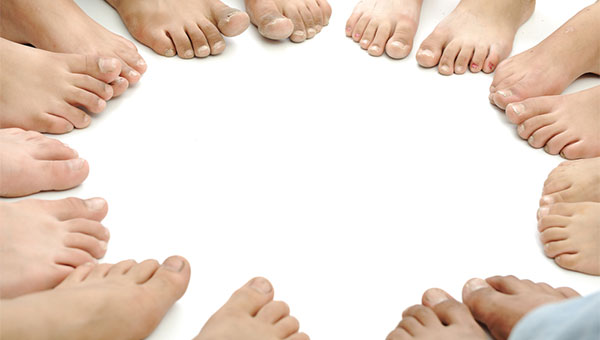Foot Facts
 Why couldn’t the two feet get along? Because they both thought they were right. Our feet help us stay active and take us where we want to go. On the other hand, or foot, they can impact our daily routines when they’re in pain, infected by fungi or covered in calluses. That’s why it’s important to take good care of our feet.
Why couldn’t the two feet get along? Because they both thought they were right. Our feet help us stay active and take us where we want to go. On the other hand, or foot, they can impact our daily routines when they’re in pain, infected by fungi or covered in calluses. That’s why it’s important to take good care of our feet.
Here are a few ways to keep them healthy, according to the National Institutes of Health (NIH).
- Check your feet regularly
- Wash your feet with lukewarm water and soap every day
- Trim your toenails carefully – cutting them straight across but not too short
- Wear shoes that are comfortable and fit properly to avoid blisters, corns and calluses
Long Distance
The American Podiatric Medical Association notes that by the time most Americans turn 50 years old, they have journeyed 75,000 miles on foot. And the health of your feet could provide your doctor with insight into other health conditions you might have. According to the NIH, numbness or tingling could mean diabetes, stiffness in your foot joints could indicate arthritis, and swelling in your feet could be signs of high blood pressure, heart disease or kidney disease.
Feet that are sweaty also might cause skin problems like eczema and rashes, and the American Orthopedic Foot & Ankle Society says you could make these conditions worse by wearing shoes that are too tight, that don’t let your feet dry adequately or by wearing nylon socks and plastic shoes.
Treating Those Tootsies
The organization recommends that you wear soft, thick cotton socks and change them every day and that you let your shoes dry out after wearing them.
The foot and ankle society adds that athlete’s foot is a rash caused by a fungus infection that usually occurs between your toes, and it typically can be treated with anti-fungal lotions and powders and good hygiene.
BayCare offers a network of podiatrists throughout Tampa Bay and central Florida that provide expert foot treatment for several conditions. For a physician referral, call 1-800-BayCare (1-800-229-2273) or find a doctor near you.
